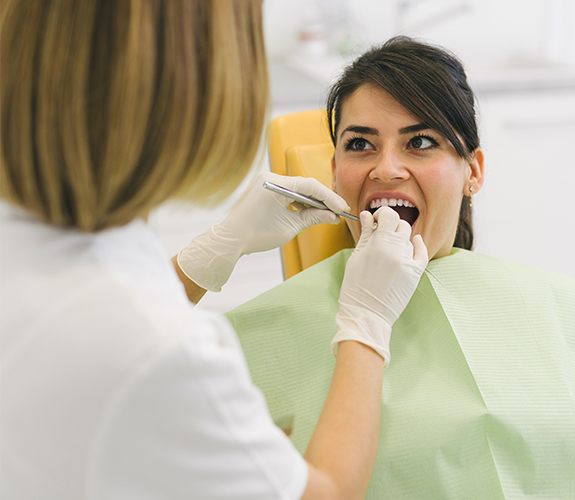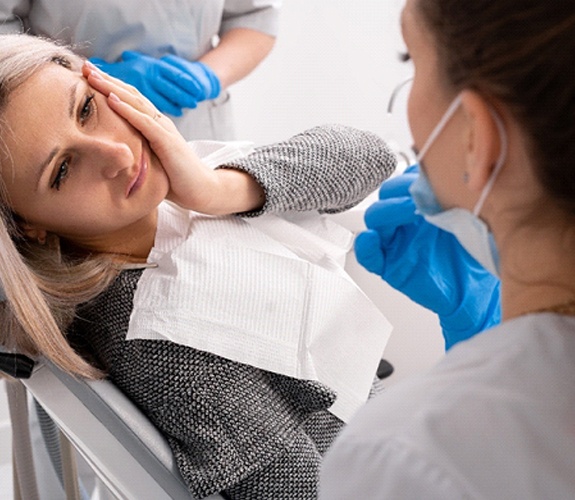
Emergency Dentistry – Sycamore, IL
Get Urgent Care When You Need It
Can’t live your life because of dental discomfort? When a serious oral health problem appears, Grand Dental – Sycamore is prepared to provide solutions. Get in touch with our dental office and we’ll do everything we can to schedule you for a visit right away, often the same day. If your emergency is occurring after-hours, you’ll be able to reach our on-call dentist. In these instances, a dentist can ease your difficult situation with over-the-phone guidance and urgent emergency dentistry in Sycamore, IL.
Why Choose Grand Dental - Sycamore for Emergency Dentistry?
- On-Call Dentists Ready to Help
- Stay Relaxed with Dental Sedation
- Get Scheduled on Saturdays
How to Handle Common Dental Emergencies

When a dental emergency occurs, its usually when you least expect it. Whether or not you know what to do next, you should always call our dental office right away. Our team can get you scheduled and is even available after-hours to provide guidance in your difficult situation.

Toothaches
Toothaches generally mean an underlying problem inside your tooth is present. In the meantime, take ibuprofen, apply a cold compress in 10-minute intervals (on and off), and rinse your mouth with salt water.

Chipped/Broken Teeth
Find any pieces of tooth, gently rinse, and bring them to our dental office. Use sugar-free chewing gum or orthodontic wax to cover jagged portions of your remaining tooth to prevent cutting your mouth.

Knocked-Out Tooth
Get to our dental office within an hour and bring the tooth with you. Do not touch the root or remove any tissue still attached. Handle by the crown portion only. Rinse your mouth with warm water and place it into the open socket. Alternatively, keep it in milk or salt water and get to our dental office.

Lost Filling / Crown
Replacing or repairing your restoration reduces your risk of an infection. If you have the crown, rinse it under water and reattach it using a piece of sugar-free chewing gum or denture adhesive. Call our dental office and we’ll see if we can reattach it, assuming there is no decay or damage on the tooth's surface.
How to Prevent Dental Emergencies

Most dental emergencies are difficult to predict (and therefore avoid), but you can prevent the majority of them by:
- Using a mouthguard when playing contact sports
- Wearing a nightguard if you grind your teeth
- Going to our dental office every six months for an exam and cleaning
- Never chewing or biting on inedible items
- Avoiding tobacco products
- Brushing and flossing regularly
The Cost of Treating Dental Emergencies

In order to provide you with a specific cost of your emergency care, we need to perform an exam and confirm the cause of your emergency. From there, we can develop a treatment plan that stops dental pain and ensures proper healing can occur. Don’t be afraid to ask our team any questions regarding treatment, financing, or maximizing dental benefits.
Dental Emergency FAQs

Grand Dental – Sycamore is a dental practice focused on the needs of our patients. When an individual calls to alert us to their dental injury, our team works quickly to address the pain as well as the underlying issue. We want our patients to be equipped to handle injuries while waiting to see our team, and we believe to accomplish this we must provide answers to some of the most common questions. Below is a list of answers we’ve compiled to help individuals feel more aware and prepared should a dental emergency occur. Contact our emergency dentist in Sycamore to inquire further or to schedule an appointment.
What should I keep in my emergency dentistry kit?
Having an emergency dental kit on-hand is essential to avoid further damage, especially when dealing with an oral injury. Some of the most common (and beneficial) things to keep in this type of kit include:
- Sterile gloves
- Gauze
- Cotton balls
- Dentist’s office phone number
- Ice pack
- Floss
- Anti-inflammatory medication
- Small container for a tooth or restoration
- Denture adhesive
- Dental cement
- Topical anesthetic
What is causing my jaw pain?
Chronic teeth grinding and clenching puts stress on the jaw joints, which can cause serious jaw pain. Also, facial injuries as well as those sustained to the jaw can heal poorly, resulting in immense discomfort. Other possible reasons for jaw pain include arthritis and temporomandibular joint disorder (TMD), which a dentist can treat using a personalized plan that includes occlusal splints and an adjustment.
Can I pop a dental abscess on my own?
This type of dental emergency in Sycamore should always be treated by a skilled professional. Individuals with abscesses should never try to pop them at home but instead, wait until they can see a dentist. Attempting to do this alone can result in additional bacteria entering the infected area, causing further irritation.
If a person is unsure about visiting the dentist because of money concerns, it is always best to seek professional help instead of leaving it untreated. Forgoing treatment can be extremely dangerous when dealing with an abscess, causing the infection to spread throughout the mouth, neck, throat, and head.
Can superglue be used to repair broken dentures?
It is strongly advised that patients with broken dentures do not attempt to repair them using superglue. Not only is this substance highly toxic, but it can cause allergic reactions in some individuals. It also causes food to taste bad, and it is ineffective in damp environments. Because the inside of the mouth is considered damp, it will not work. Instead, it is best for individuals to wait until seeing a dentist instead of trying to repair the damage at home.